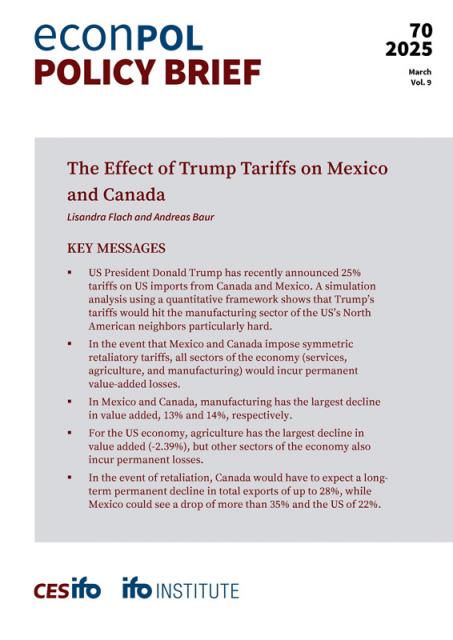If you would like to receive the latest press releases from EconPol Europe, email info@econpol.eu
Press releases
Higher Corporate Taxes Lead to a Decline in Private Investment
Higher corporate taxes lead to a decline in private investment in Germany, shows a study conducted by the EconPol research network. A 1 percentage point increase in local business tax leads to a 3 percent decrease in investment activity. “This means that every additional euro of tax revenue would cause companies to invest two euros less on average,” says Andreas Peichl, Director of the ifo Center for Macroeconomics and Surveys.
Stopping Russian Energy Imports Could Cost Germany 3 Percent of Annual Economic Output
In the short term, a halt to Russian energy imports could cost Germany up to 3 percent of its gross domestic product. This is the result of estimates by the EconPol Europe network calculated with a simulation model. Oil and coal could be replaced by imports from other countries, but it is harder to find replacements for gas, the authors write. “Germany should take quick and decisive action to reduce its dependence on Russian gas. Without appropriate measures today, we run the risk of being vulnerable to blackmail this winter,” says Prof.
Germany and Austria use European Recovery Fund Mainly to Replace National Spending
Germany and Austria are using the EU’s Recovery and Resilience Facility primarily to finance existing or planned projects rather than to invest in new projects. This is the central finding of a new study by the research network EconPol Europe. “This suggests that the EU funds are mainly used to replace national spending that governments would have made anyway,” says Mathias Dolls, scientific coordinator of EconPol and co-author of the study.
Fiscal Policy Measures Saved at Least 200,000 Jobs during the Covid-19 Crisis in Austria
Fiscal policy measures aimed at mitigating the economic impact of the Covid-19 lockdown measures in Austria led to higher employment by about 200,000 persons in 2020 and by about 41,000 persons in 2021. This is a key result of a large-scale macroeconomic simulation study carried out by EconPol Europe. Out of the 200,000 persons who remained in employment in 2020 thanks to fiscal measures, 191,000 can be attributed to short-time work schemes alone. “Short-time work schemes were particularly successful in preventing employment from plummeting in line with real activity.
Politicians Often Postpone Tax Increases to Directly after Elections
Tax increases in industrialized countries are often implemented directly after elections. This is a finding of a new study by the research network EconPol Europe. “Our findings show that politicians seem to postpone tax rate increases to the year after elections. We saw increases mainly in value added and sales tax (VAT) rates after elections – in other words, taxes that the majority of voters feel directly in their wallets,” says Niklas Potrafke, co-author of the study.
